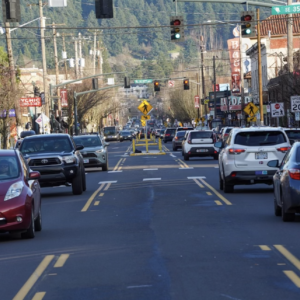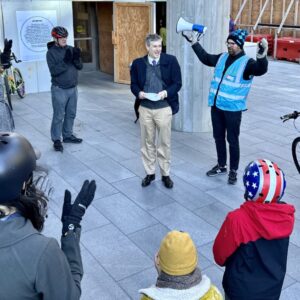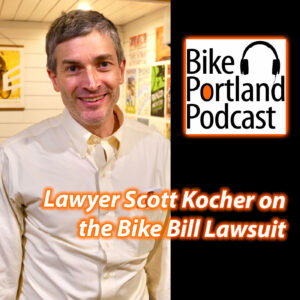Portland-based advocacy group BikeLoud PDX has amended their lawsuit against the City of Portland and the revised complaint was filed at the Multnomah County Courthouse Friday.
The lawsuit alleges that the City of Portland has “systematically failed to comply” with the 1971 Oregon law known as the “Bicycle Bill” (ORS 366.514) which requires cities to build cycling and pedestrian infrastructure whenever a road is reconstructed.
Circuit Court Judge Christopher Ramras dismissed the case after its first hearing back in May, but he told BikeLoud’s legal team that they could amend their complaint and refile. Specifically, Judge Ramras agreed with attorneys for the City of Portland that having BikeLoud as the sole plaintiff was problematic because the nonprofit organization, on its own, doesn’t have adequate “standing” — that is, a right to sue. Their argument was that an advocacy group is, “a pretty general and abstract [legal] interest,” and that, “There’s no special injury [legal term for harm] affecting BikeLoud’s members differently than other citizens.”
So the BikeLoud legal team — which consists of Scott Kocher of Forum Law Group and three lawyers from Thomas, Coon, Newton & Frost (both firms are BikePortland advertisers) — has added 15 Portlanders to the lawsuit.
“There are real people behind these concerns and it’s not just an abstract, generalized need for safer infrastructure.”
– Scott Kocher, lawyer for BikeLoud
The list of plaintiffs now includes: Kathryn Gavula, Petra Whitacre, Edward Gorman, Douglas Eichelberger, Allan Rudwick, Taizz Medalia, Robert Burchett, Ted Whitney, Steven Acker, Lynda Bishop, Shambra Jennings, Daniel Fuller, Mark Ontiveros, Max Woodbury, and Karen Frost.
Each one of them, BikeLoud argues in court filings, “have been adversely affected by defendant’s failure to comply with ORS 366.514 in a way that the great majority of Portland residents who do not regularly ride bicycles for transportation are not.”
Plaintiff Kathryn Gavula commutes by bike several days a week from the Mt. Tabor area to her job in Northwest Portland and bikes her three children to school in east Portland. Her route, the lawsuit says, “or routes that she would ride on a regular basis if bicycle facilities allowing safe passage existed,” include the Hoyt Yards area of the Pearl District, SE Hawthorne, and SE 82nd Ave.
The owner of West End Bikes in downtown Portland, Mark Ontiveros, is another one of the plaintiffs. “Mr. Ontiveros has compelling interests in having adequate bicycle facilities throughout Portland,” the suit alleges. “If people in Portland do not have safe and attractive places to ride bicycles, he will not have customers coming into the bicycle shop where he works.”
Max Woodbury, a 51-year-old who uses a handcycle after he became a quadriplegic following a work accident in 1996. “Among the many Portland streets upon which Mr. Woodbury depends for his mobility, he regularly uses SE Hawthorne Boulevard and SE Division Street from SE 10th to SE Cesar Chavez Blvd for restaurants and grocery and other shopping,” the suit states. “He is adversely affected by the lack of bicycle facilities at those locations.”
Another notable plaintiff is Karen Frost, the first executive director of the Bicycle Transportation Alliance (now The Street Trust), the bike advocacy group that filed the original Bicycle Bill lawsuit in 1994. “Ms. Frost has not owned a car in 23 years and uses two bikes with trailers for all errands including grocery shopping, trips to the hardware store, and transporting large product purchases,” reads the amended lawsuit. “She has regular need to use Hawthorne Boulevard and the Hoyt Yards area, among other locations subject to the present lawsuit.”
“We’re hopeful that adding these individuals will make it clear there are real people behind these concerns and it’s not just an abstract, generalized need for safer infrastructure,” Kocher shared with BikePortland today.
Kocher says it could take a few months for Judge Ramras to review the amended complaint. If the judge agrees with BikeLoud, the case will move forward into the next phase of discovery and both sides will get to make their arguments. If the judge isn’t persuaded, the case would get kicked down to the Oregon Court of Appeals where it would take about two years before getting heard.
That might sound like a defeat, but BikeLoud would still have hope. After losing at district court, the BTA eventually won their case two years later at the Court of Appeals and the City of Portland was forced to recognize the Bicycle Bill and stripe bike lanes in front of Moda Center.
If BikeLoud’s case sees a similar fate, the City would be on the hook for much more than one block of bike lanes: The suit includes 21 specific locations that encompass hundreds of city blocks.
Read the amended complaint here.







Thanks for reading.
BikePortland has served this community with independent community journalism since 2005. We rely on subscriptions from readers like you to survive. Your financial support is vital in keeping this valuable resource alive and well.
Please subscribe today to strengthen and expand our work.
Thank you BikeLoud and the people who signed on to this. We are lucky to have you!
This is great. If the plaintiffs win I assume this would have repercussions state wide.
How does taking money out of city coffers to fight a lawsuit help this situation??
What course of action would you propose instead?
It gets the city to follow the law so they don’t get sued again.
Clearly, the city had and has no intention or plan to mitigate the hazard posed by the tracks. Litigation is a valid response in this case and the city is fortunate for such a meager settlement. Furthermore, the injuries incurred caused incalculable harm and were preventable.
Imagine a similar hazard posed to automobiles traveling on a dense urban street (a pothole several blocks in length, for example) causing a similar injury to a driver. One of the drivers sues. Would anyone ask “how does taking money out of the city coffers to fight a lawsuit help this situation?”
In this hypothetical scenario, the city would fix the problem. We can only hope the city will finally mitigate the hazard these tracks and other conditions pose to cyclists. More lawsuits will likely need to follow.
Litigation (unfortunately) is how our laws evolve in the US. The threat of litigation from bad drivers is also why we have so many poorly protected bike lanes with plastic instead of concrete.
As an active cyclist and bike commuter myself you nincompoops are self-defeating with your frivolous lawsuits and rabid progressive activism. We all live in the 3rd/2nd if not most bikeable city in the US, yet it feels like you all will never be happy with anything.
Could it be that Portland is more bikeable today because the self-defeating nincompoops in the past didn’t settle for being 10th or 20th or whatever Portland’s ranking was at the time they decided not to be happy with anything?
You can’t possibly be an active cyclist and bike commuter if you think Portland is really bikeable. I smell a troll.
Sorry for not joining the pity party, but I think Portland is a great place to be a bike rider.
Me, too, but I consider myself a strong/confident/experienced bicyclist. We make up a small minority of total potential bike riders in this city.
We aren’t the ones that have stopped riding in this city. It’s the more vulnerable riders who are dropping out. And that’s the issue.
How do you know that?
Even if you’re right, the comment I was responding to said that active cyclists (i.e. folks like you and me) could not in good faith think Portland was bikeable, and got an incredible 18 upvotes. Something is very wrong in this community.
Status quo is the way to go? Not for me. I’m not convinced you have experienced or even imagined a city where cycling, walking, and transit are prioritized and made safe.
The bicycle infrastructure in Portland is amazing. That’s not what is up for discussion. The bottom line is people’s safety. We live in a personal vehicle dominated society. Accidents happen, but some can be prevented through bicycle and pedestrian infrastructure development. I think this lawsuit, even if it’s shot down, brings the conversation that needs to be had to the table. But that’s just my opinion. 🙂
This is a missed opportunity and is a classic case of forgetting your allies – it is not “the bicycle bill” it is the “Pedestrian and Bicycle Bill” as clearly stated in the suit. There are hundreds of places where pedestrian facilities were required as well under that bill, and including pedestrians I believe would have broadened class and scope (IANAL).
I hope they win, and I hope the ruling isn’t written so narrowly cyclists aren’t the only ones to benefit.
If bike riders want the same rights as vehicles or special rights, they should be required to have a license and insurance to operate on public right of way.
Yes I agree. I’d be the first person pushing for bicycle licenses… but it only seems fair that if we are regulated in a similar way we should have a similar level of quality for our infrastructure and other needs. When the system starts to treat bicycling with the same respect as driving, only then does it make sense to consider similar regulations.
And at what age can one start applying for a bike license and what happens to children who bike who are not of that age or otherwise didn’t get a license? And who are we going to tax to pay for a driver license program and increase staffing to enforce licenses? There’s a million reasons bike licenses are dumb and multiple examples that prove it.
Bicycle licenses are a waste of effort, time and money. They’ve been tried and failed everywhere they’ve been tried.
https://shifter.info/heres-why-all-the-reasons-for-licensing-bikes-fail/
https://www.outsideonline.com/outdoor-adventure/biking/a-very-dumb-history-of-the-bicycle-license/
Finally, to flip this around, if motorists want the same rights as other vehicles they should pay for the negative externalities that currently all of us subsidize motorists for.
Adam,
I am just trying to be cute in how I counter the silly idea of licensing bicycles. I do not need an education about why it’s a bad policy as I’ve been very outspoken and very public about my opposition to the idea. Again, I just like to throw that hypothetical out there because people who call for bike licenses will never agreed to treating bicycling the same as driving if it means equal funding and fair treatment in every other systemic aspect.
Your last sentence hits it on the head. Call me arrogant, but compare my ≥ 5k miles a year driving a Prius + 4k miles a years of cycling means I should get the credit for the -externalities I’ve thus removed from society. Meaning that I get around just fine burning 100 gallons of gas a year for my car, as opposed to say a 20k year 4Runner commuter who would burn 10x as much…let the 4Runner driver pay for my bike infrastructure, they’re using 10x the fossil fuels anyway.
I would be alright with this, with the condition that all future funding for infrastructure projects be split 50/50 between car infrastructure and bike infrastructure.
Most bike riders already have a drivers license and many also own a car and therefore also have insurance.
If street walkers want the same rights as vehicles or special rights, they should be required to have a license and insurance to operate on the public right of way.
We shouldn’t be making special spaces for street walkers!
Autonomous vehicles should have all the space.
I wonder how many hundreds of times this has been discussed on BP’s site and social media? Your automobile use is subsidized by non-users, not the other way around. Studies about it (see below) consistently find that a car-free bicycle user overpays for what they use, and an automobile user uses more than they fund.
Fees for licenses and registrations only cover the costs of administering those things (DMV offices, employees, etc.). Automobiles are registered because they’re very dangerous, plus it helps facilitate recovery of stolen vehicles and makes theft more difficult. Sometimes car insurance gets mentioned, as though this is a benefit for street infrastructure, but the payments are for the insurance company. If bicycle use was killing people every day as automobile use is, certainly insurance would be required for bicycle users.
Automobile-specific user fees such as fuel taxes don’t cover half the costs of maintaining car-related infrastructure, in fact they don’t keep up with wear caused by automobiles. Most traffic infrastructure is funded from propery/payroll/business/etc. taxes which everybody pays.
Even the fuel you use is very heavily subsidized. It would be several times more expensive, if all costs were built into the purchase price.
I chuckled at “same rights as vehicles” since a bicycle is a vehicle.
The True Costs of Driving: Car owners don’t come close to covering the price of maintaining the roads they use
http://www.theatlantic.com/business/archive/2015/10/driving-true-costs/412237/
American Roads Depend on Handouts From Bus Riders, Cyclists, Pedestrians
http://usa.streetsblog.org/2015/05/05/american-roads-depend-on-handouts-from-bus-riders-cyclists-pedestrians/
Traveling by car six times more expensive for society than by bicycle, study finds
http://cycling.today/traveling-by-car-six-times-more-expensive-than-by-bicycle-study-finds/
The Gas Tax Has Little to Do With Road Costs
https://www.instituteforenergyresearch.org/regulation/gas-tax-little-road-costs/
Do motor-vehicle users in the US pay their way?
http://citeseerx.ist.psu.edu/viewdoc/download?doi=10.1.1.549.7212&rep=rep1&type=pdf
– this is a study that analyzes taxes vs. expenditures in various ways
If you believe this is true in Portland, please cite a source.
Are you doubting me without reading the resources I mentioned? There’s a lot of data mentioned or linked in those articles. Funding is mostly similar from one city to another in the USA. How is Portland’s funding different?
If most infrastructure were paid from fuel taxes, gas would be a lot more expensive.
Portland does not use property taxes, payroll taxes, or business taxes for roads. I honestly don’t know what other places do, but this is a pervasive myth about here.
Because people keep asserting this, and it bugs me, I looked into this a bit (for about the 10th time) a few weeks ago when someone pointed out (correctly) that, at the federal level, there are some general fund dollars seeping into the system, but I don’t think that’s what you’re referring to.
PBOT gets its money from meters, gas taxes, and ODOT, and ODOT gets its money from road fees and the federal government, and the feds get most (but not all) of their money from the gas tax. If there’s any of the sources you cited in there, it’s de minimis.
Drivers pay for the roads, and this benefits non-drivers as well. Unfortunately, it’s not going to work forever, but it’s the current state-of-play.
https://www.portlandmercury.com/news/2023/05/24/46523056/pbot-is-on-life-support-inside-portlands-transportation-budget-crisis#:~:text=Right%20now%2C%20PBOT%20is%20mainly,registration%20fees%2C%20and%20federal%20grants.
Sorry, just a correction because there’s someone here who always calls me out on this… drivers and freight haulers pay for the roads here.
You’re arguing against several resources I linked including peer-reviewed studies. I could explain the issues with your comment, but I’d just be repeating info in articles/studies I’ve linked already.
The only resource you linked is strictly about PBOT, and not about funding of traffic infrastructure but the organization itself. If you understood transportation infrastructure, you’d know that some areas are managed by a city, others by a county, others by a state, and still others federal. The funding comes from a lot of sources. The funds from fuel taxes don’t cover half the costs. Toll fees typically fund a piece of infrastructure, such as a bridge if the toll is paid for crossing at a bridge. Fees for licenses and vehicle registrations typically just cover the costs of administering those things, none of the money goes to traffic infrastructure.
I don’t have a vested interest in any part of this discussion (I am not from Portland) but how does a quadriplegic use a hand trike… Is it only partial quadriplegia?
Pre post edit: it is infact partial quadriplegia that spans the gap between para- and quadriplegia!
Post edit: also I watched with cool promo by some hand bike company, the wheelchair bound, hand bike gang featured in it is pretty awesome
Addendum to your point, and in the interest of sharing some language nuance that I’ve learned recently … As you saw in that promo, wheelchairs are liberating devices for people that use them. They are incredible tools (like bikes!) that enable all sorts of practical and joyful movement about the world. Identity-related language is personal and there are many opinions, but to share one quote regarding the terms “confined” or “wheelchair bound” which I’ve found to be broadly representative:
https://canbc.org/blog/proper-terminology-dont-use-confined-to-or-wheelchair-bound/